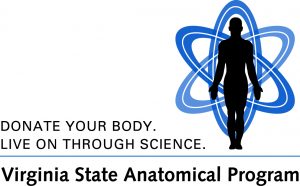***If it has been more than 2 years since you updated your registration forms, we recommend that you contact us to update your information***
In order to protect the health and safety of staff, educators, students, and researchers during the COVID-19 pandemic, VSAP has instituted the following criteria in addition to previous criteria utilized to determine acceptance:
- History of SARS or SARS-COV-2 infection within the past 60 days.
- Direct contact with a known or suspected case of COVID-19 in the last 28 days (including caring for, living with, visiting or sharing a healthcare waiting area or room with known individual with COVID-19)
All individuals accepted will be tested for COVID-19 prior to placement.
Established in 1919, the Virginia State Anatomical Program (VSAP) is the only program in Virginia authorized to receive donations of human bodies for scientific study. The primary mission of VSAP is to educate health professionals by providing human donors for the teaching of anatomy and surgery and medical research to the State’s medical schools, colleges, universities and research facilities.
The goal of VSAP is to provide Virginians with an opportunity to make a valuable and generous gift to the living through donation of his or her body after death for study and research in medical science in a dignified, respectful and professional manner.
-
- The Virginia State Anatomical Program (VSAP) is an agency within the Department of Health. It does not receive state funding nor does it pay for donated bodies
- Donors are used for education and research. No tissue is transplanted into a living person (which distinguishes whole-body donation from organ donation).
- VSAP provides donors to six Virginia medical schools, seventeen colleges and universities, five community colleges, and two biomechanical research facilities.
- Unfortunately, all potential donors are not acceptable. Some medical conditions or circumstances of death may cause a potential donor to be unsuitable for anatomical examination (see Criteria for Acceptance). VSAP encourages all potential donors to discuss alternative arrangements with their next of kin or responsible party in case the donation is not accepted. If the potential donor is not accepted, responsibility for burial or cremation rests with the next of kin/responsible party or executors.
- Registration with VSAP does not guarantee acceptance.

Whole-Body Donation
You give many gifts in your lifetime, but there is one special gift that will make a significant and lasting contribution, the gift of donating your body to medical science through the Virginia Department of Health’s State Anatomical Program.
There currently is more demand for donors than there are people willing to donate. The number of healthcare educational programs in Virginia is increasing which in turn increases the need for additional donors. The need for anatomical donors is great.
Donation is a gift of education to the many hundreds of doctors, nurses and other health professionals studying in Virginia medical schools, colleges and universities who must learn how the human body is constructed before they can successfully treat living patients. No models, films or books can substitute for the actual study of the human body itself. Your donation will make an impact, one that plays a critical role by providing the opportunity for students to learn, train and research.
Your gift will improve the lives of Virginians because your donation:
-
- Helps health professionals learn more about anatomy and physiology by providing lessons in anatomical structures.
- May help identify causes of disease and assists students in improving treatment and patient care.
- Will be instrumental in researching new treatments, procedures, and devices with the focus on improving sustainable patient healthcare.
- Assists with the development of advanced medical training for physicians, surgeons, emergency responders, and other healthcare professionals by providing for hands-on experiences.
- You help further medical education and scientific research.
- You avoid traditional burial and cremation costs.
- Memorial services can still be conducted.
- The cremated remains of the donor will be returned after the study is completed. (A timeframe is not guaranteed, but can range from a few months up to 5 years. The average is currently 18 to 24 months.)
